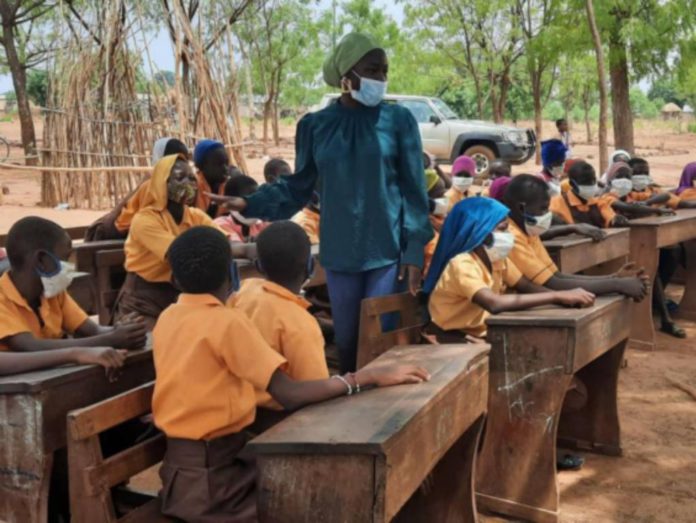
Ghana introduced a bold new curriculum of the future in 2019 labelled the ‘Standards-Based Curriculum’ (SBC) for kindergarten to primary six. While this new curriculum reform alters the country’s education landscape for the better, it is not enough to cause the expected shift from the traditional method of teaching practised in Ghanaian classrooms.
The National Council for Curriculum and Assessment (NaCCA) has explained that the rationale for the introduction of the ‘Standards-Based Curriculum’ was to change the content and structure of the education system largely focused on passing examinations to building character, nurturing values, literacy, confidence, and critical thinking of children. The key features of the new curriculum include the acquisition of the 4Rs (reading, writing, arithmetic, and creativity), development of core competencies/twenty-first-century skills (foundational and lifelong skills), learner-centred pedagogies (e.g., differentiation, scaffolding, and use of ICT), and inclusion and diversity in education.
This direct response by Ghana to the objective-based curriculum (OBC) which has been in existence since 1961 when the Education Act was passed positions it as one of the emerging countries in the world where learning through play is being promoted as an important strategy to promote the holistic development of children.
Play-based learning (PBL) or learning through play (LtP) is considered by researchers as an effective teaching and learning tool that helps children to be creative and imaginative, hones their physical abilities, engages their natural curiosity, and allows them to pursue their experiences based on their individualised interests, strengths, and skills while learning to make sense of the world around them. Play-based learning pedagogy entails both child-led and teacher-designed learning opportunities.
The benefits inherent in playful learning are not available to children when teachers use the traditional method of teaching which follows the drill and rote method of memorisation. With this outdated method sadly used in Ghanaian classrooms at a wider scale, children learn through repetition and memorisation, with little to no scope for critical thinking and independent thought processing.
The Minister of Education, Dr Yaw Osei Adutwum eruditely summarised the problem Ghana is facing when he addressed delegates at the United Nations General Assembly on September 21, 2022. “I speak with students and when I finish, I ask them ‘do you have any questions for me?’…[and] no hand goes up…We have tamed the children. We just want them to write down what we tell them and on the day of exams, they should put down what we have told them [then] we say you’re the best student the country has ever known.”
The former Mathematics and Information Technology teacher at the Manual Arts High School continued that “[this] kind of education system will not transform Ghana. That kind of education system is not going to give us critical thinking individuals, especially since we are in the 21st century and education 4.0 and the Fourth Industrial Revolution.”
The repetition of the challenges with Ghana’s education system by the Minister of Education is not noble because we all know these problems exist and have come up with a response to them. What I think should be of concern to all of us is what has been done or is being done by the Ministry of Education and its agencies such as the Ghana Education Service (GES) and National Teaching Council, among others to ensure that the SBC implementation does not suffer.
Already, teachers are citing the lack of adequate information, basic resources, and tools, including textbooks, teaching and learning materials (TLMs), among others as key obstacles affecting the smooth implementation of the Standards-Based Curriculum in their schools.
It is worth pointing out that a successful implementation of the SBC which will benefit Ghanaian children would require a thorough training of teachers facilitated by trainers knowledgeable in the new teaching and learning approach, adequate textbooks for both teachers and learners, a key policy response, and funding commitment from the government.
To maximise the gains in this area, the government should consider partnering with like-minded institutions both local and international who are ever ready to provide logistical and technical support to make this work.
Changing the traditional teaching method used in Ghanaian classrooms to the modern teaching method where the learning needs of children are prioritised should not be business as usual. The time to reinvent and sustain a bold new system of education that focuses on the learning, psychological, physical, cognitive, and emotional needs of Ghanaian children is now or never, and this would require all of us to muster the needed courage to get this done.
We should expect the government, and Ministry of Education and its agencies to bring teachers and the entire nation along this noble path to shared knowledge, prosperity, patriotism, and good neighbourliness.
The author, A. Kwabena Brakopowers is a development communication practitioner, essayist, and broadcast journalist who has written extensively on national and international politics, education, economy, and health. He could be reached at brakomen@outlook.com or visit www.brakopowers.com
